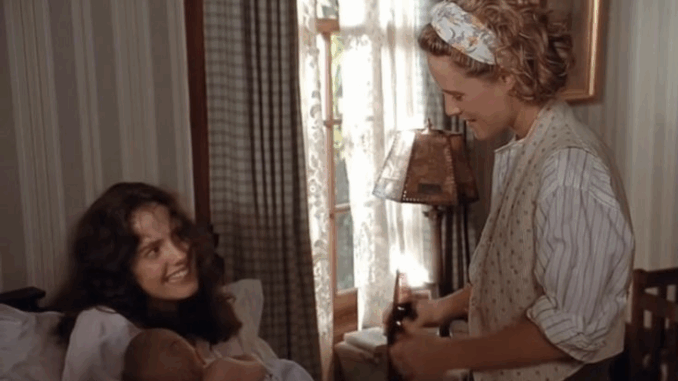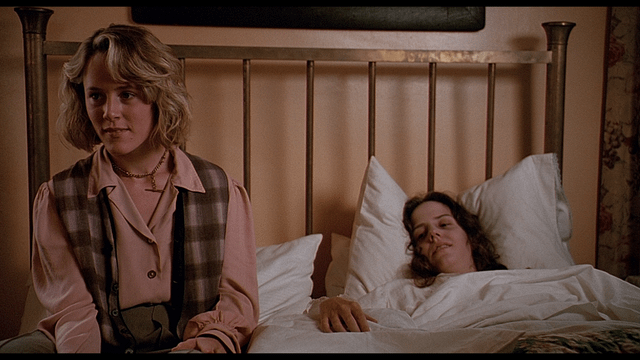
A Crime and a Community in Crisis
In a town as tight-knit as Whistle Stop, secrets are hard to keep. So when Frank Bennett—Ruth’s abusive husband—disappears without a trace, suspicion simmers just beneath the surface. Though it takes time, the law eventually comes knocking, and one of the most quietly suspenseful and revealing sequences in Fried Green Tomatoes unfolds: the courtroom trial.
This isn’t a trial filled with dramatic objections or fiery speeches. Instead, it simmers with subtext, glances, and a quiet but unwavering resolve. It’s not just about guilt or innocence; it’s about survival, solidarity, and a town deciding which kind of justice it believes in.
Idgie on the Stand: The Mask of Mischief
Idgie Threadgoode, as always, faces the world with a mix of charm and defiance. When she takes the witness stand, her tone is light, playful even. She spins tales that distract, disarm, and frustrate the prosecutor trying to prove that she and Big George are responsible for Frank’s death.
Her storytelling here becomes a weapon, a shield, and a rope tying the community together. She dodges direct answers, not to deceive, but to protect—to use wit as her form of rebellion. Idgie has always existed outside the law’s boundaries, but here she engages with it on her own terms.
We see in her eyes that this isn’t a game. Her life, and Big George’s, are on the line. But she refuses to betray her values, or those she loves.
Big George: The Scapegoat of Racism

The trial isn’t just about Frank’s disappearance. It’s also a stark commentary on race and power in the 1930s South.
Big George, the gentle, towering man who barbecues for the café, is targeted simply because he is Black. The court’s suspicion doesn’t stem from evidence—it stems from prejudice. It’s clear that if anyone is going to be punished, the authorities are prepared for it to be him.
This reality makes the courtroom scene unbearably tense. Big George stands accused not for what he did, but for who he is. And yet, he stands quietly, his dignity intact, knowing the odds are stacked against him.
The town of Whistle Stop, however, refuses to let the system win.
The Town Takes a Side
One by one, townspeople show up in court. Their presence is silent but loud. By simply being there—filling the benches, watching every word—they send a clear message: Whistle Stop stands with Idgie and Big George.
It’s one of the most profound examples of chosen family and community loyalty in the film. People who could easily stay silent instead show up. People who may not always understand Idgie’s wildness or Ruth’s quiet strength still understand this: justice isn’t always legal.
Their shared silence in the courtroom becomes a collective defense. They don’t rat out the truth. They don’t crack. Even those who suspect the real story choose the side of compassion.
This is rural Southern resistance—not with picket signs, but with quiet, stubborn presence.
Sipsey’s Secret: The Hidden Hand of Justice
What the court doesn’t know, and what viewers only later discover, is that it wasn’t Idgie or Big George who killed Frank Bennett.
It was Sipsey.
The soft-spoken, wise Black woman who had raised children, cooked meals, and tended quietly to everyone’s needs stepped forward in a moment of pure maternal instinct. She killed Frank to protect Ruth’s son from being taken by an abuser. No jury in the South of that era would ever acquit her. So the town makes sure no jury ever hears the truth.
This revelation, shared late in the film, doesn’t change the courtroom scene in retrospect—it deepens it. Everyone in that room was protecting more than just a friend. They were protecting the soul of their community. They were saying: in this town, no one harms a child and gets away with it. In this town, justice may not follow the law—but it is no less real.
The Verdict: A Collective Victory
Eventually, the trial ends with Idgie and Big George found not guilty. The tension breaks. Smiles return. But the impact of what just happened lingers.
It wasn’t the brilliance of legal arguments that saved them. It wasn’t evidence. It was loyalty. The town’s refusal to give in to fear. Their decision to protect each other above all else.
In a world where legal systems often fail the most vulnerable, Whistle Stop delivers its own verdict: love over law, community over corruption, truth over technicality.
Reflections in the Present Timeline
In the nursing home, as Ninny recounts the trial to Evelyn Couch, her tone is rich with pride. She knows what it meant. She doesn’t need to say outright that she was there—or that she was more involved than she lets on.
Evelyn, listening, begins to absorb a new kind of lesson. That courage doesn’t always shout. That justice doesn’t always wear a robe. That women and men on the margins have always been finding ways to protect one another, even when the world doesn’t care.
It is through Ninny’s memory that Evelyn sees how strength works in the real world. Not through domination, but through solidarity.
Legacy of the Trial Scene
The courtroom scene in Fried Green Tomatoes may not be the flashiest moment, but it is one of the most essential. It captures the film’s core themes—resistance, loyalty, and chosen family—within the structure of a legal drama. It takes the archetype of the Southern courtroom and turns it into a parable of justice outside the system.
In many ways, the scene is also a love letter to those who keep silent not out of fear, but out of protection. To those who stand beside their neighbors, even when they don’t understand them. To those who know that sometimes the best way to fight injustice is simply to show up, stay silent, and hold the line.
Conclusion: Justice, Southern-Style
The courtroom trial in Fried Green Tomatoes is less about law and more about love. It’s about what happens when an entire town decides that some people, and some truths, are too sacred to betray.
Through glances, quiet resistance, and the power of collective loyalty, Whistle Stop delivers its verdict—not just to the judge, but to the world:
This is our family. We protect our own.
And sometimes, that’s the most radical justice of all.
